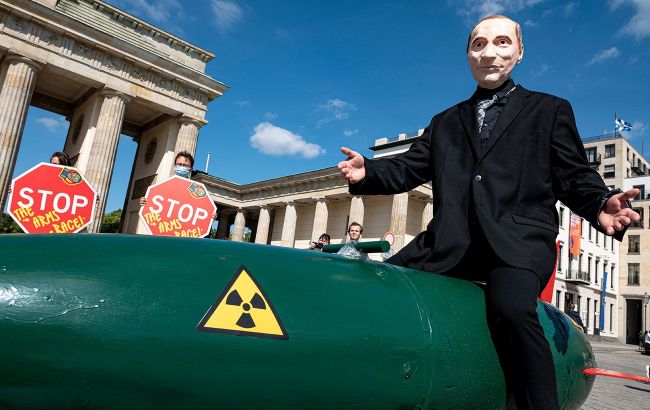CNN uncovers Russia's nuclear space weapons program and its implications
 Photo: Russia is developing nuclear space weapons (Getty Images)
Photo: Russia is developing nuclear space weapons (Getty Images)
The Russian Federation is attempting to develop nuclear space weapons capable of disabling a vast number of commercial and government satellites with an energy wave upon detonation, reports CNN.
As the publication explains, the destruction of satellites will impact:
- Mobile communication;
- Bill payments;
- Internet functionality.
House Intelligence Committee Chairman Mike Turner sparked controversy during his statement, declaring that his committee "has information about a serious threat to national security." By Friday, White House Chief of Staff Joe Biden confirmed that Turner was referring to a new Russian nuclear anti-satellite weapon, but official sources consistently refused to discuss the matter due to the highly classified nature of intelligence data.
Representatives of the Biden administration emphasized that the weapon is still in the development stage and has not been deployed into orbit. However, its utilization would cross a dangerous threshold in the history of nuclear weapons and could cause extraordinary disruptions in everyday life.
"This kind of new weapon — known generally by military space experts as a nuclear EMP — would create a pulse of electromagnetic energy and a flood of highly charged particles that would tear through space to disrupt other satellites winging around Earth," CNN reports.
There is no nuclear threat
Biden noted that there is no nuclear threat in the world. Everything Russia does is related to space and can only harm satellites.
The Ministry of Defense and the intelligence community have been tracking Russia's efforts to develop a wide range of anti-satellite weapons, including EMP, for years.
As explained by a representative of the defense department, in recent months there has been a flow of intelligence reports specifically related to Russia's efforts to develop nuclear anti-satellite capabilities.
Recently, the rogue state has made progress in developing nuclear electromagnetic pulse technology - a related but much more alarming technology.
The roots date back to the end of the Cold War
As another American official explained, the development of space nuclear weapons is not a new concept and dates back to the end of the Cold War. However, concerns are raised because the weapon could disable a significant portion of certain orbits, creating a minefield of disabled satellites, which "would then prove dangerous to any new satellites we might try to put up to replace or repair the existing satellites."
Currently, the question remains whether nuclear weapons can affect GPS satellites and nuclear command and control satellites, which operate at a higher orbit than the vast array of commercial and government satellites in low Earth orbit. According to a former Pentagon official, it all depends on how close they are to the EMP, how old they are, and how powerful the blast will be.
"Last-ditch weapon"
According to experts, space nuclear weapons could have the potential to destroy constellations of small satellites, such as SpaceX's Starlink, which Ukraine successfully uses in its war with Russia.
This would likely be Russia's "weapon of last resort," as it would also cause harm to any Russian satellites in the same area.
"It also remains unclear how well-developed the technology is. Russia has had a number of public debacles with their nuclear technology in recent years. In 2019, seven Russians were killed in a nuclear accident that occurred while Moscow was trying to recover a nuclear-powered cruise missile that had crashed into the White Sea during a failed test," CNN reports.
According to Biden administration officials, Russia's launch of nuclear space weapons would be the first violation in history of the 1967 Outer Space Treaty, which prohibits the placement of weapons of mass destruction in outer space.
"It would be a violation of the Outer Space Treaty to which more than 130 countries have signed up to, including Russia," Kirby said.

